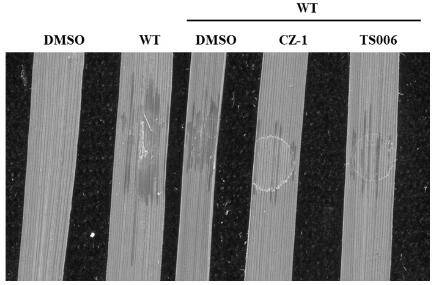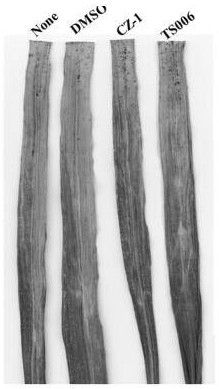Application of 2-methoxyphenylpropionic acid compound in prevention and/or treatment of plant diseases
A technology for methoxybenzene and plant diseases, used in the prevention and/or treatment of plant diseases, in the field of 2-methoxyphenylpropionic acid compounds, to reduce the occurrence of drug resistance, have broad application prospects, and delay the occurrence of drug resistance. Effect
- Summary
- Abstract
- Description
- Claims
- Application Information
AI Technical Summary
Problems solved by technology
Method used
Image
Examples
Embodiment 1
[0036] Example 1 Test compound CZ-1 in the T3SS system hpa1 repression of gene promoters
[0037] The mutant strain ( hpa1 inPXO99 A ) on the PSA plate for activation, pick a single colony after 2 to 3 days and place it in M210 liquid medium, add cephalosporin and ampicillin, and grow to OD 600 About 2.0, transfer to fresh M210 medium according to 1:100, grow to OD 600 About 0.6, collect the bacteria by centrifugation, wash the bacteria once in XOM2 medium, then resuspend in XOM2 medium, add cephalosporin and ampicillin to adjust the OD 600 to 0.3, add the compound to be tested to a final concentration of 200 μM, use an equal volume of DMSO as a solvent control, treat at 28 °C and 200 r / min for 15 h, repeat each treatment 3 times, collect the cells by centrifugation and wash with 0.01 mol / min Resuspend the bacteria in L PBS (pH=7.4) buffer and adjust the OD 600 About 0.1, the mean fluorescence intensity (MFI) of GFP detected by flow cytometry.
[0038] The experimenta...
Embodiment 2
[0043] Example 2: Test compound CZ-1 on wild-type strain PXO99 A growth effects
[0044] The test process is: PXO99 in the presence of the test compound in rich medium M210 and T3SS induction medium XOM2 respectively. A growth curve. Since XOM2 is a poor medium, PXO99 A There was almost no growth in it, so 0.5% sucrose was supplemented as a carbon source. Will xoo Wild-type strain PXO99 A Streak on the PSA plate for activation, pick a single colony after 2 to 3 days and place it in M210 liquid medium, add cephalosporin, grow to OD 600 About 2.0, collect the cells by centrifugation, wash the cells once with sterile water, and then resuspend them in M210 or XOM2 to adjust the OD 600 is 0.1. 200 μM of the test compound was added, placed on a 96-well plate, and an equal volume of DMSO was used as a solvent control, and 3 replicates were set for each treatment. Set the temperature at 28°C, and measure it with a fully automatic growth curve instrument. Data were read every...
Embodiment 3
[0047] Example 3: Compound CZ-1 to PXO99 A Effects of Hypersensitivity Response (HR) on Tobacco
[0048] PXO99 A Strains were cultured in M210 medium to OD 600 About 2.0, collect the cells by centrifugation, resuspend the cells in sterile water, and adjust the OD 600 To 0.8, three compounds to be tested were added, and an equal volume of DMSO was used as a control, and treated at 28 °C for 2 h. The treated PXO99 was then injected with a needleless syringe A The strain was inoculated on Nicotiana benthamiana cultivated for two months, and the tobacco was continued to be cultured in the greenhouse after inoculation, and photographed to observe the phenomenon after 24 hours.
[0049] Compound CZ-1 on PXO99 A For results on the effect of HR on tobacco see figure 2 . It can be seen from the figure that the effect of compound CZ-1 on the treated PXO99 A HR was significantly suppressed in the non-host plant tobacco.
PUM
 Login to View More
Login to View More Abstract
Description
Claims
Application Information
 Login to View More
Login to View More - R&D
- Intellectual Property
- Life Sciences
- Materials
- Tech Scout
- Unparalleled Data Quality
- Higher Quality Content
- 60% Fewer Hallucinations
Browse by: Latest US Patents, China's latest patents, Technical Efficacy Thesaurus, Application Domain, Technology Topic, Popular Technical Reports.
© 2025 PatSnap. All rights reserved.Legal|Privacy policy|Modern Slavery Act Transparency Statement|Sitemap|About US| Contact US: help@patsnap.com



